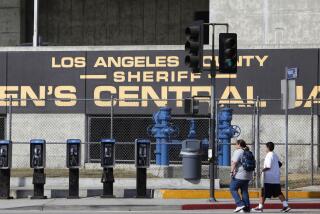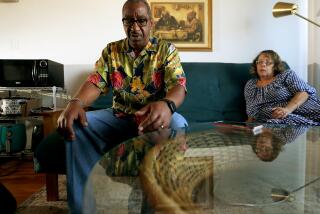Youths in detention should be released to reduce coronavirus risk, advocates say
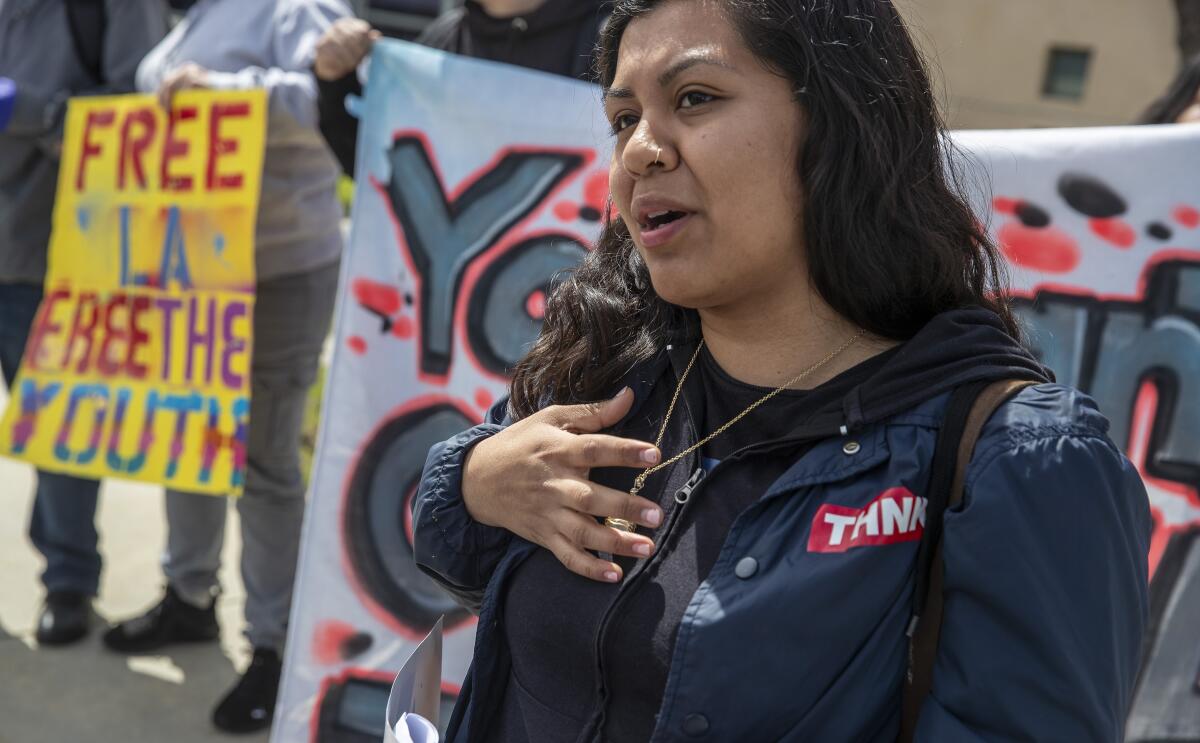
- Share via
Her 16-year-old son was crying, his mother said, when he called Saturday morning from a Los Angeles County juvenile hall. Family visits were being suspended due to the coronavirus, he told her in a 10-minute conversation.
For more than nine months, Lina, who would only provide her middle name to protect the privacy of her child, had visited her son practically every weekend. He struggled with depression and their meetings were a bright spot during an otherwise difficult time.
“He’s probably not going to be happy the rest of the time he’s in there,” she said. “That hurts me as a parent. That hurts my heart.”
As coronavirus cases continue to rise and government-ordered restrictions paralyze daily life across the state, juvenile justice advocates are urging officials to protect the mental and physical safety of California’s thousands of detained youth.
In recent days, defense attorneys have combed through their caseloads seeking to expedite the release of juveniles in custody. They point to the virus’ ability to spread quickly in congested areas and the risk that suspension of family visits could dangerously isolate children even further.
“Being in these facilities for these kids is really, really stressfu,l and the only time they have felt any type of letting down of their guard was when they were visiting with their friends and families,” said Ji Seon Song, president of the Pacific Juvenile Defender Center, an organization that provides guidance to juvenile defense attorneys in California. “It seems like a very harsh, counterproductive measure and just a really sad thing for our clients.”
In a letter Monday to state and local officials, Song’s group called for the immediate release of all youth held in county facilities who have not been convicted of their charge and all youth who have been convicted and are being held on technical probation violations. It also called for the state’s Division of Juvenile Justice facilities to release youth who would not pose a serious physical safety risk to the community.
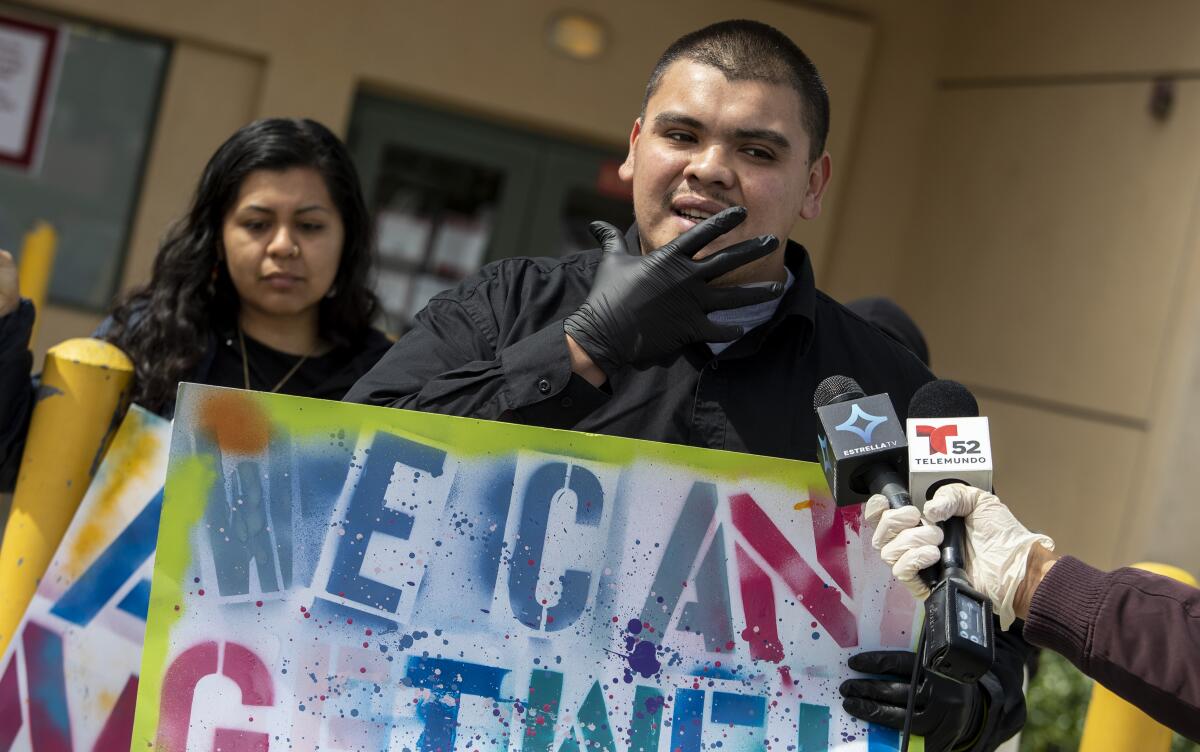
Among a series of recommendations, the letter said that all arresting agencies should move to cite and release certain youth instead of booking them and potentially introducing the virus to juvenile detention facilities.
The demands come as criminal justice officials struggle to balance public safety with health concerns. On Monday, the L.A. County Sheriff’s Department announced it was releasing inmates from its jails and cutting down on how many people it books into custody to protect those housed in close quarters.
Detention operations like the L.A. County Probation Department and the state Division of Juvenile Justice have suspended family visits, and, as of yet, neither has announced confirmed cases of coronavirus at their facilities.
Gov. Gavin Newsom’s office did not return requests for comment about calls to release juveniles. In a statement on Tuesday, the L.A. County Probation Department said that it was currently screening all youth admitted to facilities for risk of infection at the time of admission and would be collaborating with attorneys so that children are not sent back to juvenile hall for first-time probation violations -- a decision that’s ultimately at the discretion of the court.
“The Department is working with the courts and legal partners on methods to safely reduce the juvenile population housed at Probation facilities through strategies such as holding first time violations in abeyance,” the statement said.
County officials have said that the prohibition on visits applied to weekend, special and after-court visits from family or community groups, but that it would not stop court-ordered or required legal visits from taking place.
“The department values visitation as an essential part of family reunification,” officials wrote in a news release. “Youth in juvenile facilities will have extended phone privileges to maintain contact with family and loved ones and all internal programming within the facilities will continue. In addition, the department will explore the feasibility of other options for families to communicate with their youth, such as video conferencing from various community locations.”
The department also said it was taking steps to minimize the risk of the coronavirus by posting additional signs, ensuring restrooms and staff quarters are clean and well stocked and bringing in more staff to regularly clean and disinfect common areas.
But advocates and health experts say that doesn’t go far enough. The virus, they argue, has many opportunities to enter detention facilities as staff come and go every day.
“There’s nothing to make us think that a COVID-19 cannot spread through a crowded juvenile facility as quickly as it could spread through a cruise ship,” said Anne Spaulding, a professor of epidemiology and medicine at Emory University. “Individuals are very close to each other. Social distancing is more difficult in a crowded facility.”
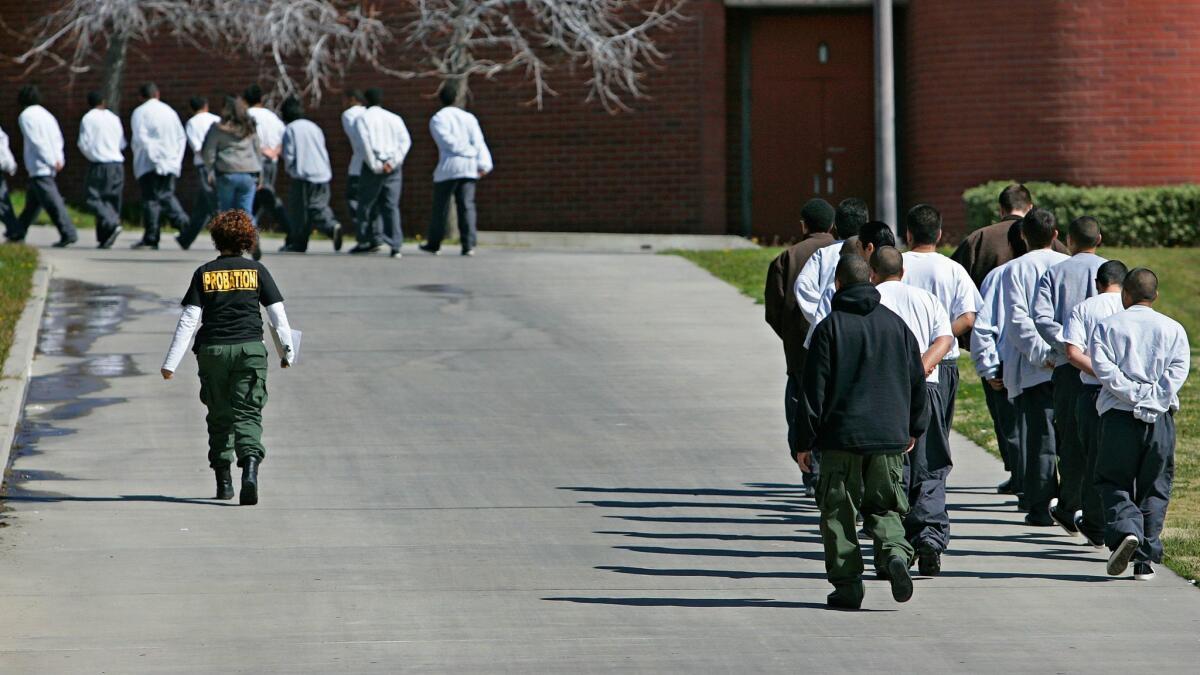
The letter by the Pacific Juvenile Defender Center asked that youth in custody awaiting residential placement be immediately released to a family member, residential group home or other noncustodial setting. For youth that remain in detention, the center urged that county and state facilities develop a thorough and public preparation plan that addresses hygiene and safety concerns as well as the emotional needs of youth who are separated from their families.
The issue has become an urgent matter for public defenders in various counties. Jane Newman, an assistant L.A. County public defender who oversees juvenile operations, said that attorneys have been reviewing their caseloads first for clients who are medically fragile, have nonviolent offenses, or have been detained on technical violations and may be eligible for release. She said that her team is continuing to identify cases while court proceedings are suspended for several days due to the virus. Juvenile delinquency detention hearings will be among a limited number of proceedings continued in courthouses when they re-open on Friday.
Some attorneys are submitting motions that cite the epidemic as grounds for release. Last Friday, Samantha Buckingham, the director of Loyola Law School’s Juvenile Justice Clinic, filed a motion that referenced the number of known cases of the virus in California and Los Angeles and argued that her 15-year-old client would be at greater risk of contracting the virus and exposing others if he were kept inside a detention facility.
“The concern is that they’re going to lock kids in their cells in order to quarantine them and that’s going to be traumatizing,” said Buckingham, whose client was released that day.
The worries are the same across the state. In a letter dated March 13, San Francisco public defender Mano Raju asked that the city and county’s chief juvenile probation officer assess all detained youth for release, clear warrants and place a moratorium on nonviolent violations. He said he was focusing on seeking the release of youth who are particularly young, suffer from maladies like asthma or are immunocompromised.
In Santa Clara County, Nisreen Younis, a juvenile supervising attorney in the public defender’s office, said that her colleagues had been working successfully with the probation department and the district attorney’s office to release in-custody youth who do not pose a public safety risk.
“Given that the schools have shut down and many families are now home, the public defenders are arguing that many of our youth now have constant supervision at home/community,” she wrote in a statement.
If juveniles are to remain incarcerated, they will need more access to the outside world, advocates say. Kim McGill, an organizer with the Youth Justice Coalition, said county officials should provide youth with access to unlimited, free phone calls, Skype, FaceTime and teleconferencing so they can remain in touch with their families.
For now, parents can only wait. Kimberly, who declined to disclose her last name to protect the privacy of her 15-year-old son, said officials at the L.A. County detention facility where he resides gave him just a couple of minutes to call her over the weekend to tell her they were halting family visits.
The weekly visits, she said, have allowed her to update her son on his case and let him know he’s not alone. She said she has gotten little information directly from the county and is worried about his health.
“I know they’re not doing the visiting, but I don’t know what else they’re doing,” she said. “Are they making sure everyone is washing their hands frequently? Are they correctly screening them on their symptoms? I have no idea.”
More to Read
Sign up for Essential California
The most important California stories and recommendations in your inbox every morning.
You may occasionally receive promotional content from the Los Angeles Times.

